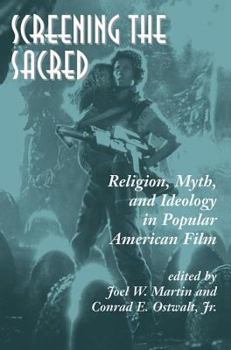Screening The Sacred: Religion, Myth, And Ideology In Popular American Film
Select Format
Select Condition 
Book Overview
What are the religious impulses in the 1976 film Rocky, and how can they work to shape one's social identity? Do the films Alien and Aliens signify the reemergence of the earth goddess as a vital... This description may be from another edition of this product.
Format:Paperback
Language:English
ISBN:0813388309
ISBN13:9780813388304
Release Date:March 1995
Publisher:Routledge
Length:207 Pages
Weight:0.75 lbs.
Dimensions:0.4" x 6.0" x 8.8"
Customer Reviews
1 rating
A Review of "Screening the Sacred"
Published by Thriftbooks.com User , 23 years ago
Martin, Joel and Conrad Ostwalt Jr., Screening the Sacred: Religion, Myth, and Ideology in Popular American Film. Boulder: Westview Press, 1995.In a general sense, Screening the Sacred, as indicated by the Library of Congress classification found on page iv, is a book about the religious aspects of motion pictures. More specifically, as the subtitle indicates, it is a book concerning religion, myth and ideology of popular American film.The thesis of Screening the Sacred can be found on page 4 of the "Introduction" where Joel Martin writes that there needs to be a rethinking of "the relations of religion and film, of religious studies and film criticism, and of religion and contemporary culture" with the hopes that their anthology will convince, on one hand, "students of film that they should take religion seriously and, on the other, convince students of religion that they need to take popular films seriously."As noted above, the book is subdivided into three thematic units, theological criticism, mythological criticism, and ideological criticism. At this point, I would like to explore the author's meaning and use of these approaches.Theological criticism tends to analyze how religious texts and thinkers have talked about God and try to relate these representations to modern and postmodern realms. While primarily concerned with Judeo-Christian scriptures, theological criticism studies the "cathedrals" of classic religious concerns, sensibilities and themes and how they are expressed in films. The basic assumption behind such criticism is that certain films can be understood as an elaboration on or the questioning of a particular "cathedral." The means by which to explore these "cathedrals" can occur in at least two ways. In the first, criticism draws on traditional concepts of good and evil, redemption, grace, home, forgiveness and uses them as windows to understanding. In the second, there is a reliance on allegorical interpretation where it is assumed that God has caused history to happen in a way that always points to Judeo-Christian traditions. In this type of interpretation, critics study and gloss for signs of the prophetic message.Unlike the narrow scope of theological criticism, myth criticism employs a much broader definition of religion which asserts that religion manifests itself through cross-cultural forms, including myths, rituals, systems of purity and gods. Thus, it is possible to glean from any such film a culture's bedrock assumptions and aspirations. Myth critics, therefore, focus on our psychological quest for meaning and aspects of our world not normally accessible through the conscious mind. Or as Albanese might say, seeing the extraordinary in the ordinary.Whereas meaning is an important focus of myth criticism, ideological critics study the relationship of religion and society, with the underlying notion that culture and art shape and are shaped by politics. These critics interpret film as a system of r




